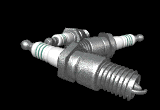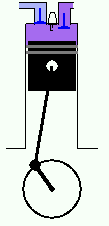Efficiency Loss

- One of the major reasons for the loss of efficiency in an engine is the sheer number of parts moving at high
- speeds. The movement creates great amounts o f friction between parts, which uses much of their moving energy to create heat. Lubricants and cooling systems can only do so much about this problem, and the typical internal combustion engine remains only about 20-25% efficient.
One can calculate the engine efficiency of a Carnot cycle engine using the thermal efficiency equation:
ec = 1- (Tc/Th)
This equation does not portray the level of inefficiency in a normal combustion engine because everyday engines experience more frictional effects.

H.O. Penn
-
The process shown below is an illustration of the movement of a piston in a four-stroke engine. The strokes are,
- from left to right, intake, compression, ignition, power, and exhaust. This process is important to illustrate because inside the cylinders is where engines lose a great deal of potential power to heat expenditure. Friction between the cylinder wall and the sides of the piston creates resistance and heat, some of the ignition heat conducts through the cylinder wall and is not used for power, and the ignition itself can not be relied upon to actually burn all the fuel brought into the cylinder.





Ralph Moros
-
A properly tuned engine should effectively burn up most of the gas in the cylinder and transfer amajority of the
- force into propelling the piston into its power stroke, but if an engine is timed wrong, serious power losses can be experienced and resources will be wasted. In the ignition stroke, the compressed mixture should ignite a few degrees before top dead center (TDC) in order to maximize the force to the power stroke, but in a poorly timed engine, the ignition could occur too late in the stroke. When this occurs, the cylinder fires with too little compression, the power stroke is very weak, and extra gas is left over. This gas is then vented out the exhaust port and wasted.
- On the flip side, an engine that fires too soon could be viewed as inefficient because it could potentially tear
- itself apart, thus producing no power at all.
Return to Main Page






